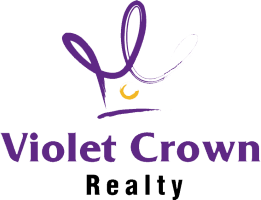DefinitionsViolet Crown Realty2014-12-16T17:58:14-05:00
- Amortization Schedule: Schedule showing principal and interest payments throughout the life of the loan
- Appraisal Fee: Fee for lender-required appraisal to establish property value
- Attorney’s Fee: Charges by independent attorney for preparation of legal documents and acts of representation
- Attorney’s Fee (Release): Charge for preparation of the release of lien document when seller is paying off his/her existing loan
- Certified Funds: The Title Company will require a Cashier’s Check for closing. Personal checks or cash over $1000 cannot be accepted.
- CMA: A Comparative Market Analysis is used to determine what similar properties have sold for in the same neighborhood or area, in the past 3-6 months. Your agent should prepare a CMA before making an offer on the property.
- Commission Fee: generally paid by seller to real estate brokers for sale of property
- Credit Report Fee: Fee assessed by lender to obtain credit information from credit bureau
- Discount Points: Points that the lender charges to increase the investor’s yield. The buyer and/or seller may pay the points as negotiated in the contract. Points fluctuate with current mortgage rates.
- Earnest Money: This is the amount of money the buyer deposits with the Title Company upon acceptance of the offer to purchase. This money is credited to you at closing.
- Easement: There are many types of easements on a property. The most common types are for utility companies to have access to their lines. No permanent structures can be built on an easement, but moveable items like storage units or playscapes are OK.
- Effective Date: This is the date that all signatures and initials are on a contract. All dates in the contract refer to the effective date, which is on the signature page of the contract (now called an Executed Contract).
- Escrow Balance: The amount that is in reserve monthly in an escrow account. Your mortgage company pays taxes & insurance annually from this account. There will always be a cushion of money, which is your balance.
- Escrow Fee: Charge by Title Company to service transaction and to escrow money and documents. This charge is generally split between the buyer & seller.
- Executed Contract: When all signatures and initials are on a contract, the agent fills in the Effective Date on the signature page of the contract; it is now Executed.
- Flood Certificate: If your home is in a 50 or 100-year flood plain, the lender will require flood insurance or a certificate proving that it is NOT in a Flood Zone.
- Funding: Occurs when the money from your lender has been wired to the Title Company after closing. Most sellers give possession after funding.
- Homeowner’s Assoc. Fee: Maintenance fee assessed to property owners within a condominium or townhouse complex, a planned unit development, or a single-family residence subdivision. Neighborhoods older than 30 years rarely still have HOA fees.
- HUD-1: This is the Settlement Statement that is prepared by the Title Company before closing. It will show all of the charges and credits for both the buyer & seller.
- Insurance Premium: paid one year in advance for buyer’s hazard or homeowner’s policy. Two additional months of insurance is held in reserve in your escrow account.
- Lender Inspection Fee: As required by the lender to determine condition of the property. (Optional)
- Lender Required Reserves: Money, required by the lender and collected at closing, which goes into the escrow account. Insurance premiums & taxes are paid into the account.
- Mortgagee’s Title Policy: Required by the lender to insure that the lender has a valid lien; it does not protect the buyer. It is also usually required for second mortgages and seller financed transactions. (Approx: $175)
- MLS: The Multiple Listing Service is the database of all of the homes on the market.
- Origination Fee: Fee buyer pays to lender to originate a new loan; normally 1 percent of loan amount.
- Owner’s Title Policy: Insures buyer against loss due to any defect of the title not excepted or excluded from the policy. (Seller usually pays for this.)
- Pay-off Amount: Amount needed to pay off existing mortgage lien on the property being sold. This may be up to one interest payment HIGHER than the loan balance.
- Pre-paids: These are the up-front charges that are paid at closing or put into your escrow reserves account. (Taxes, Insurance, MIP)
- Processing Fee: Charge to process loan for approval.
- Recording Fee: Charge by the county clerk to record documents in the public records. The amount is based on the number of pages recorded.
- Repairs: Any repairs required by lender and/or warranted by inspections and to be paid at closing.
- Survey Land: survey, required by the lender, which includes: lot size, easements, encroachments, locations of improvements, etc. Typically a buyer’s expense, but an existing survey may be reused one time if there have been no changes.
- Tax Certificates: Issued by taxing authorities to show the amount of the current year’s taxes and the last date that taxes were paid.
- Tax Proration: Seller pays buyer taxes from January 1 through the day of closing. Buyer pays for the entire year in December. (From the escrow account.)
- Tax Service Fee: Fee required by the lender for collection and disbursement of tax escrow by a servicing company.
- Termite Inspection Fee: Required by the lender to show that the property is free of active termites. May be a negotiated requirement on the contract. (see WDI Certificate)
- Underwriting Fee: Fee that the lender charges for underwriting the loan(s) on behalf of the investor.
- VA Funding Fee: An administrative fee charged by the Veterans Administration.
- WDI Certificate: A Wood Destroying Insect (termites) clear report is need by some lenders.
- Wire/Funding Fee: Lender’s charge for sending “good funds” to the title company.






